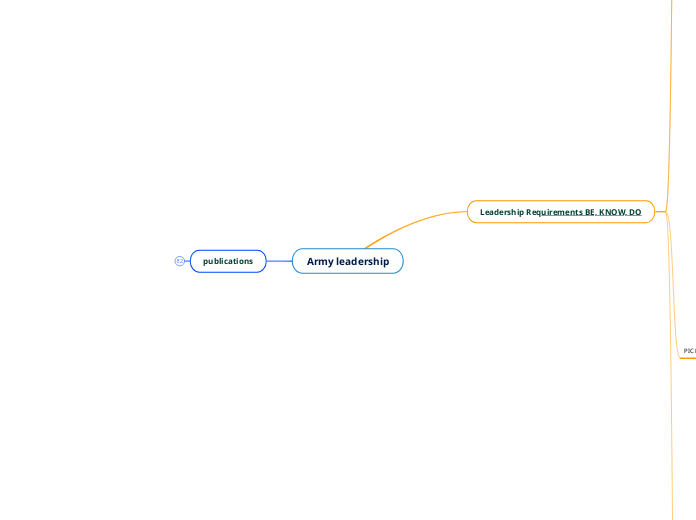Army leadership
Leadership Requirements BE, KNOW, DO
recommendation: write down observations of other leaders
leadership definition
the activity of influencing people by providing purpose, direction and motivation to accomplish the mission and improve the organization
PIC LAD
leader attributes
PIC
presence (be)
Be Confident for Respect
VISIBLE, WALK THE TALK, ROLE MODEL
Presence is how others perceive a leader based on the leader’s appearance, demeanor, actions, and
words. Leaders with presence demonstrate military and professional bearing, fitness, confidence, and
resilience. The actions, words, and the manner in which leaders carry themselves should convey confidence,
competence, and a positive example for others to emulate Leaders able to do what they ask others to do, who can ‘walk the talk,’ generate a positive reputation that contributes to their effective presence around Soldiers.
Unfortunately, some lose the respect and confidence of their
subordinates because their presence provides little or no positive effect on others.
The actions, words, and the manner in which leaders carry themselves should convey confidence,
competence, and a positive example for others to emulate.
Presence represents who leaders are and what they
stand for. Every leader has presence.
Part of projecting a positive
leadership presence is being comfortable in one’s own skin.
subordinates are always observing how leaders carry themselves,
Leaders who routinely share in hardships and dangers have firsthand knowledge of what they
are asking subordinates to do, and show their subordinates that they are not above putting themselves at the
same level of risk or discomfort.
intellect (know)
Intellect is fundamental to successful leadership. Intellect consists of one’s brainpower and knowledge. Intellect enables leaders to think creatively and critically to gain situational understanding, make sound judgments, solve problems, and take action. Intellect allows leaders to reason analytically, critically, ethically, and with cultural sensitivity. Intellect is involved in considering the intended and unintended consequences of the decisions a leader makes. Effective leaders must anticipate the second- and third-order effects of their decisions.
Intellect is comprised of the mental tendencies or resources that shape a leader’s conceptual abilities and affect a leader’s duties and responsibilities. Leaders with high intellect are mentally agile, good at judgment, innovative, tactful around others, and expert in technical, tactical, cultural, geopolitical, and other relevant knowledge areas.
TIMES tables
character (be)
WADE, deadpool is a 'character'
mindset and moral foundation behind actions and decisions
Leaders of character adhere to
the Army Values, display empathy and the Warrior Ethos/Service Ethos, and practice good discipline.
WARRIOR ETHOS/SERVICE ETHOS
professional attitudes and beliefs. selfless commitment
evaluation
soldier's creed
The Warrior Ethos creates a collective commitment
to succeed with honor.
The Warrior Ethos connects Soldiers of today with those whose sacrifices have sustained America’s
existence. The Warrior Ethos is crucial but Soldier commitment may be perishable. Consequently, the Army
must continually affirm, develop, and sustain its Warrior Ethos. The key to the Warrior Ethos is a mindset
developed through purposeful mental preparation. Growth in character, confidence, composure, mental
agility, and resilience are outcomes of internalizing the Warrior Ethos, as well as the service ethos of DA
Civilians.
ARMY VALUES
DISCIPLINE
EMPATHY
need
standard
strength
leader competencies
LAD
do
lead
ELECT
Leaders set goals and establish a vision, motivate or influence others to pursue the goals, build trust to
improve relationships, communicate and come to a shared understanding, serve as a role model by displaying
character, confidence, and competence, and influence outside the chain of command
Leaders motivate, inspire, and influence others to take initiative, work toward a common purpose,
accomplish critical tasks, and achieve organizational objectives. Influence focuses on motivating and
inspiring others to go beyond their individual interests and focus on contributing to the mission and the
common good of the team
Effective leaders clearly communicate what needs to
be done and why.
LEADS BY EXAMPLE
evaluation
components
LEADS OTHERS
EXTENDS INFLUENCE BEYOND THE CHAIN OF COMMAND
COMMUNICATES
BUILDS TRUST
The noncommissioned officer wearing the chevron is supposed to be the best soldier in the platoon and he is supposed to know how to perform all the duties expected of him. The American soldier expects his sergeant to be able to teach him how to do his job. And he expects even more from his officers.
achieve
GETS RESULTS
components
no matter what
intro
purpose
develop
PESO (think 'investment')
STEWARDS THE PROFESSION
components
Bullfrog: maintain or advance the reputation of your institution
CREATES A POSITIVE ENVIRONMENT/FOSTERS ESPRIT DE CORPS
components
PREPARES SELF
DEVELOPS OTHERS
army ethic
